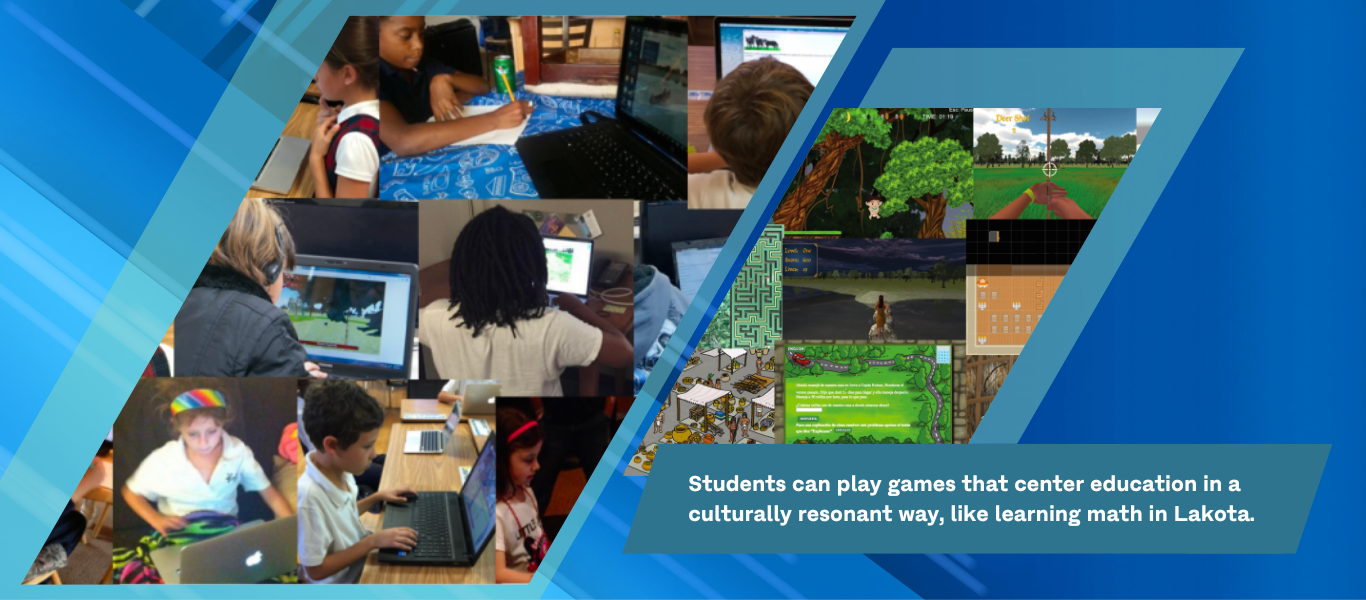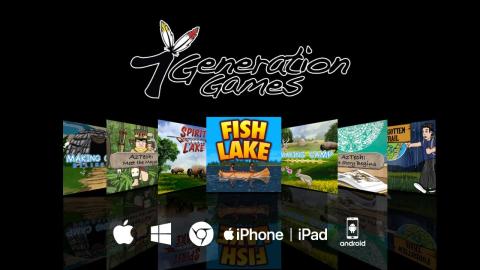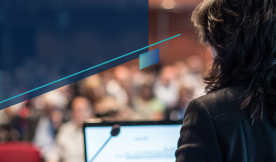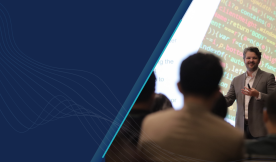Customer Discovery is the Key to Scaling Your Startup
How one GIST Catalyst alum's startup is not just surviving but thriving
This conversation with GIST’s communications members Genesis Lodise and Claire Coletti and 7 Generation Games’ co-founder Maria Burns Ortiz has been edited for length and clarity.
In 2017 the first GIST Catalyst Pitch Competition took place in Hyderabad, India at the Global Entrepreneurship Summit. More than 1500 innovators from across the globe were on hand for the week of workshops, discussions, and competitions. We had the great fortune to reconnect recently with one of the 2017 Catalyst finalists, Maria Burns Ortiz, co-founder of 7 Generation Games. Just a fledgling company at the time, 7 Generation Games has since grown and scaled, turning challenges into opportunities.
GIST: Maria, it’s so great to see you again. I think it’s been almost six years since we last saw you at the Catalyst Pitch Competition in India where your startup took one of the top prizes. 7 Generation Games has done very well since then. We’re excited to get a chance to talk to you about it. And that’s a great place to start. What is super exciting going on right now with 7 Generation Games?
Maria Burns Ortiz: Thank you! It’s great to be talking with you as well. And it’s true 7 Generation Games has been doing well and we’ve gone through significant growth and big changes recently. Our product was initially focused on being a developer platform, but through a combination of both customer discovery and other conversations that we've been having, we’re creating an interface to remove some of those tech barriers to implementation and as a result democratize that process. We're able to empower folks to use the platform to create games about anything. That's the big thing that we're working on.
GIST: I love what I just heard there. One was customer discovery, which is such a huge part of every product development. A lot of the stories we hear from early stage innovators is they either haven't done enough customer discovery or they haven't done the right customer discovery, and they don't have that product-market fit yet. So to hear that you have done all of that in order to make your product really fit with the needs of the folks that would be using it. It is super encouraging. I love that.
So, with the platform, it sounds a little like a “no code,” build your own adventure, kind of solution.
Maria Burns Ortiz: It is! Initially, it was going to require an understanding of basic HTML, Javascript, that kind of thing. That's what we were using in-house to make things faster. And then, through our customer discovery process, we ended up saying, “You know, what we really think will be more transformative is if it can be a “no code” platform. We'll still have an inbetween version that can be more customized if you are a developer and you understand how to do those things. But really, yeah, we're now looking at it having a GUI (graphical user interface) where you can upload the images, put in the text, and be able to create the games yourself.
GIST: That’s a big shift. How old is 7 Generation Games?
Maria Burns Ortiz: We started in August of 2015. That's when we quit everything else and went all in.
GIST: A pivotal moment there when you quit everything else you have. It forces you to succeed because you have no other options.
Maria Burns Ortiz: That’s true!
GIST: So I guess when we first met you at the Global Entrepreneurship Summit in India in 2017, 7 Generation Games was still pretty young–just a couple of years old. But since then, the company has managed to not just sustain itself. It has managed to really grow, and is by all accounts a success story. What would you say are the main strategies you have used to scale in that time? To not just keep alive but to thrive.
Maria Burns Ortiz: One of the big things that early on we found is we were just reacting all the time. We would just follow the money. We were building our own games, with a specific vision, and a specific customer: schools. But it's just this long, exhausting process. And we started getting folks saying “You're building games around teaching math in indigenous communities. Can you use those games for teaching decision making or literacy or language acquisition?" And we thought, “Well, could we?”
Next, people were coming to us asking to partner and do customized development. But that wasn't our initial strategy at all. So at first we pushed back, but then we ended up thinking “Why are we resisting this?” If someone wants to give us 10 times more money than we are going to get from a single school sale–and they deal with the distribution–why are we not doing that?

"My co-founder is a statistician. For them, one person is one data point. If you have a lot of data points telling you something, that's when you really start to pay attention and shift on that."
And now it sounds really obvious in retrospect. But at the time when you're focused on this is what we're doing, this is who we're selling to… You can’t see past that.
That's how we started to shift.
GIST: How has that affected your process internally and your product development cycle?
Maria Burns Ortiz: Tremendously. When we were selling under this model of highly customized products, we started talking about building an in-house platform to be able to accelerate our development process. And then we said, "Well, can our customers just use that platform?" That was the biggest shift.
It was stepping back and listening to what people were asking us for, and making sure that we could deliver that. As opposed to building what we thought people wanted. Now, that doesn't mean that we weren't getting users for the existing games that we were building. Our games were being played by hundreds of thousands of kids. But at the end of the day, we also needed to find ways to keep the lights on, because user numbers are great, but you can't pay anyone in just numbers.
We do a lot of things because they align exactly with what we do. But sometimes we've had to do things that didn't align exactly with what we do, but brought in enough money to be able to then take us to that next step. That combination of those two things is why we're still here.
GIST: Data gathering is critical to customer discovery. How did you go about getting all of the data points to inform your decision making?
Maria Burns Ortiz: We ended up doing two different programs that forced us to take the time to do customer discovery. We did the I-Corps program through NSF, and now we're doing the Vital Prize Challenge. The first program with I-Corps was literally in the weeks before COVID. We did our last interviews the week before schools closed. In that case, we were looking at not just educator needs, but also what needs to happen for our product to be deployed in classrooms. So once we had that, and we had some funding from USDA, we could build out the curriculum and content that met those needs. And then we were able to use our technology to power that on the back end. More recently, we started focusing on selling to enterprises, folks who already had the distribution channels and the sales and all those things, but didn't have the technology.
Maybe later on, down the road, you can follow back up with them when you have built out something that meets those needs. When you're doing customer discovery, you can understand the challenges they face. Their needs. A lot of it comes down to how you get people to change. Who are the competitors? What are they using? What are the things that you'll have to replace? And sometimes the things are just the status quo, right? It's not that you're replacing X product. You have to change behaviors. To get an understanding through talking to people as to what that means has been super, super helpful. When you're not selling, you still have that option to say, “Oh, and we're building this thing” and then they can say, “Oh, well, that sounds like a great thing. Let me know when that launches.” We don't talk about it as a sale. But, as you build out those relationships, you can understand what they want and then people see you're interested in what they actually need, not just trying to force them to buy your thing.
GIST: COVID affected education arguably more than any other industry. Did you find opportunities there? Or was it purely straight challenges? How did that affect your customer discovery and product development?
Maria Burns Ortiz: We were interviewing schools in-person up until two days before COVID and the shutdowns happened. The pandemic did a couple things. One, we had games. We knew they worked. We knew we developed them so that they had offline capabilities–in part because a lot of our initial funding came from USDA to look at ways to close the digital divide when it came to educational software. So we had this solution. And two, we decided that we were just going to make it free to everyone. And we had a huge surge in user numbers. I think it tripled within a matter of weeks.
GIST: It sounds like that kind of combination between a desire to have impact and then that resiliency in terms of your fundraising sources actually just enabled you to thrive in that moment where other companies might have been even more challenged.
Maria Burns Ortiz: Sometimes everything falls your way, and then sometimes you go through a phase where nothing falls your way. And so for us we always want to make sure that we can keep going because we owe it to our company, our staff, and our employees, and the people that helped us build that.
We knew that we were building things that really made a difference. It wasn't just “I feel good about this.” We're getting these stories about the work that we were doing and the outcomes and we have kids saying things like, “When I grow up, I wanna work for you.”
Those are the kind of things that make you go, “Wow! We're really making an impact.”
Sometimes you get caught up in the day to day, we're behind on something, but these kinds of things are a nice reminder of why we do what we do and the fact that it works. That’s super cool.
Thank you Maria for such amazing insight! You can follow her and 7 Generation's success at their website!



